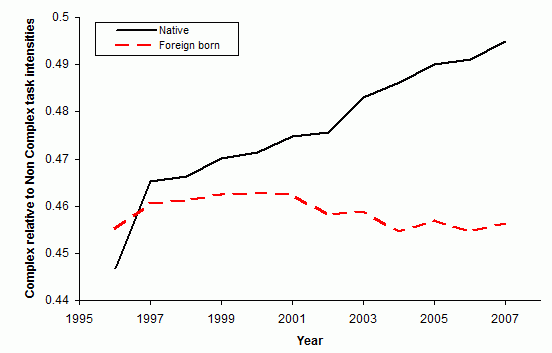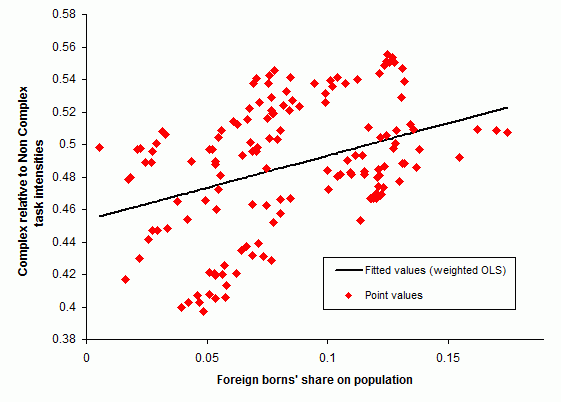Despite popular belief, often based on anecdotes and bodged analysis, there is hardly any evidence that immigrant workers have a negative effect on the wages of native workers (see for instance Card 2009 and Glitz 2007) or that they crowd-out other jobs in the US (Card and Di Nardo 2000) or Europe. On the contrary, some authors emphasise the existence of a potentially positive effect of immigrants on the demand for native workers (Manacorda et al. forthcoming).
Yet such findings appear to run against the logic of demand and supply. More immigrant workers should surely put downward pressure on the wage and employment of native workers with similar characteristics. As a consequence, some economists keep looking for something missing or incorrect in these studies and maintain that a negative wage impact of immigration has to be found.
Labour markets and specialised tasks
In a recent working paper (D’Amuri and Peri 2010), we provide a potential explanation for this phenomenon, analysing European labour markets and immigration over the period 1996-2007. Our paper follows a similar analysis one of us did for the US (Peri and Sparber 2009). Rather than considering the labour market as made up of homogeneous and identical workers with potentially different skill levels, we consider that production is divided into a series of tasks that can be organised in a continuum spanning from simple-routine and prevalently manual tasks to complex-interactive and prevalently cognitive tasks.
Companies have to perform a range of these tasks in order to produce goods or services; hence the increased supply of some of them may increase the demand for others. For instance, for a construction company the supply of more construction workers performing manual tasks (such as installing dry-walls and raising foundations) generates the need for more construction supervisors, technicians, engineers, clerks, and sale representatives (as the company grows) who typically perform more interactive and complex tasks. As these tasks are all needed to produce final goods (they are “complementary” with each other), if immigrants and native workers specialise in different segments of the task-specialisation spectrum, then more immigrants can generate higher demand for natives.
New evidence on complementarity
Our hypothesis is that immigrants, who often do not speak the language and do not master the culture and norms of the host country, are concentrated in more manual-routine tasks (especially among less educated groups). The inflow of immigrants thus increases the supply of manual skills relative to the supply of abstract skills with two effects:
- Due to the complementarity between these types of skills, the increase in the supply of manual tasks boosts relative compensation for complex skills, making them better paid.
- Exploiting their comparative advantage, natives move to occupations requiring a relatively higher level of these skills.
This positive reallocation and the complementarity of tasks can explain the lack of negative employment effects as well as the potential positive wage effects of immigration on native workers.
Aggregate European data contain patterns consistent with the idea that immigrants and natives specialise in different production tasks and with the fact that such specialisation has increased over time. Using the occupational structure of 14 Western European countries and the skill intensity of each occupation, we can construct the aggregate task content of European workers.
Figure 1 shows the evolution over time of the relative intensity of cognitive-complex versus manual-non-complex tasks for the average European worker (1996-2007), either native or foreign-born. While the average native worker increasingly special-ised in complex production tasks, the average immigrant worker experienced, if anything, the opposite trend. Immigrants’ specialisation remained almost unchanged, moving slightly towards more manual jobs. Such a diverging pattern is hard to explain by changes in the demand for skills, which would similarly affect both natives and immigrants. It also implies that recent immigrants have been taking on much more manual jobs than natives. Figure 2 shows the correlation between the relative complex/non-complex task specialisation of native workers across 14 Western European countries and the share of immigrants. The picture, in which each point corresponds to a country-year average, shows a clear positive correlation between the share of immigrants and the specialisation of natives in complex tasks.
Figure 1. Relative task complexity of occupations performed by native and foreign-born workers in Europe
Note: Authors’ calculations on EULFS data. It does not include countries for which one or more years of data are missing (Ireland, Italy, Luxembourg and UK). Relative task complexity is the content of complex relative to non-complex tasks within a certain occupation. See D’Amuri and Peri (2010), section 3, for details on the measures of task complexity.
Figure 2. Relative task complexity and share of immigrants in Western Europe, 1996-2007
Note: Authors’ calculations on EULFS data. Relative task complexity is the content of complex rela-tive to non-complex tasks within a certain occupation. See D’Amuri and Peri (2010), section 3, for details on the measures of task complexity.
As several other factors, such as the evolution of information technology and off-shoring (Acemoglu and Autor 2010; Goos et al. 2009) have affected the demand for tasks performed by natives during the considered period, in our econometric analysis we control for observable characteristics of natives and we test whether, in a country, for a given education-experience profile, an increase in the share of foreign-born workers is accompanied by an increase in specialisation of natives in complex-non-routine tasks.
We find that an increase in the share of immigrants from 8 to 12% of the population (as experienced in the average considered country between 1996 and 2007) implied an increase in the intensity of complex tasks by 3-4% (half of the difference between UK and Italy in the average intensity of those tasks). The results are robust to different skill measures and estimation techniques addressing the fact that immigrants are not randomly allocated to labour markets (as it would be in a lab experiment) but might well choose the labour market offering them the best opportunities.
Extensions and implications
Besides the effects on task reallocation, we analyse the net impact of immigration on natives’ employment and we confirm previous results that did not find any significant effect. Moreover, natives’ skill upgrading due to immigration could account for a 0.6% increase in average wages of natives in the 2008-2020 period, according to our simulations combining results of the empirical analysis with long-term demographic projections for Europe (Carone 2005).
We also find mild evidence that the positive reallocation process seems to be stronger in relatively flexible labour markets (those with less stringent employment protection legislation) and weaker in more rigid markets. This is reasonable, as the underlying process for the reallocation of tasks requires occupational mobility that is enhanced in labour markets with low costs of mobility.
This new type of analysis of the labour market impact of immigration paints a much more differentiated picture in which “tasks”, not workers, are replaced by immigrants in the production process. Hence natives may have an opportunity to move into tasks that pay better, are complementary to manual jobs, and in which they have comparative advantages. This virtuous mechanism, however, will take place only if native workers are mobile enough to change occupation and adjust to the new organisation of production.
References
Acemoglu, A and D Autor (2010), “Skills, Tasks and Technologies: Implications for Employmentand Earnings”, NBER Working Papers (16082).
Card, D (2009), “Immigration and Inequality”, American Economic Review Papers and Proceedings, (99):1-21.
Card, D, and J Di Nardo (2000), “Do Immigrant Inflows Lead to Native Outflows?”, NBER Working Paper, no. 7578, Cambridge, MA.
Carone, G (2005), “Long term labour force projections for the 25 EU Member States: a set of data for assessing the economic impact of ageing”, European economy (235).
D’Amuri, F and G Peri (2010), “Immigration and Occupations in Europe”, Cream WP (10/26), University College London.
Glitz A (2007), “The Labour Market impact of Immigration: Quasi Experimental Evi-dence”, Working Paper Universitat Pompeu Fabra, October.
Goos, M, A Manning, and A Salomons (2009), “The Polarization of the European Labour Market”, American Economic Review Papers and Proceedings, (99):58-63.
Manacorda M, A Manning, and J Wadsworth (forthcoming), “The Impact of Immigration on the Structure of Wages: Theory and Evidence from Britain”, Journal of European Economic Association.
Peri, G and C Sparber (2009), “Task Specialization, Immigration, and Wages”, American Economic Journal: Applied Economics, 1(3):135-169.




